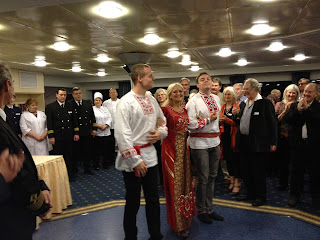For it was a splendid season, crowded but splendid. Having retained the Advent feel right up to the quiet Eucharist with the surprisingly large congregation on Advent 4, we had a full church again that afternoon for a Carol Service. Our choral group 8+1 sang, the children paraded up and down with camels, shepherds and random sheep, the mulled wine flowed and we all grew mellow and cheerful. And then, in the close proximity that had seemed so impossible in prospect - how to gear up again so soon? - we came back to church for Midnight Mass. The pic shows what we saw. And although we had to put the nave lights on because people might need to see words of carols and such, this is more or less what I saw throughout the service. There are benefits from sitting in the front row .... There were carols serious and carols frivolous: the former during communion, the latter during the serving of the cider cup (we're dead versatile when it comes to beverages). Mr B and I had our annual fun singing with our friends who happen to sing tenor and soprano. There was incense. And - joy - the crib was under the altar, and looked amazing. The starry backdrop paper was a final stroke of genius, and I recognised the packing straw from one of our presents ...
 |
| Rudolph takes tickets |
Today, however, it's hard to realise that less than a week has passed since that magical night. And really this is what has fuelled this post. The anticipation, the emotion, the celebration - these are all features of birth itself, human birth in human homes. I feel sad for the people who have their houses decorated at the beginning of December, who have no concept of Advent, of waiting, and who then tear down their lights and throw out their trees and say thank heavens that's over before it's even New Year's day. I can't help wondering how they'd see it if their standard response were to be applied to the birth of a child in their family. Picture it:
Four weeks before the baby is born, the family start decorating the house with all manner of lights, greenery and so on. The pregnant mother helps a bit, but her mind is, understandably, on other things. Occasionally there are drunken parties, all themed around the approaching birth. On the night of the birth itself, the family assemble, fight a bit. Next day they have a massive party, eat themselves sick and drink themselves into oblivion. But three days later, when the mother brings the baby home, she finds that the house is bare, tidy but bleak, and everyone has gone home. There are no more celebrations, no sense of joy. As far as everyone's concerned, it's all over until the next baby - or something.
Silly, isn't it. But some of us have only really been celebrating for less than a week, and we're still really happy about remembering what happened and demonstrating that happiness. Because what we are celebrating changed everything, just the way the birth of a new baby changes everything. And you can't put change back in the loft till next year.





































